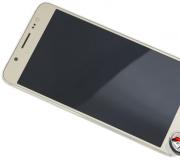What is the difference between gps and gprs. GPS, Glonass
Now many of us cannot imagine our lives without any devices that were born with the help of latest technologies. A striking example There are all kinds of gadgets designed to calculate location. They can be anti-theft devices, portable navigators or even entire tracking systems. They all have a number of features and differ from each other in their set of functions.
But the most important difference, which a potential buyer most often pays attention to, is the accuracy of determining the location coordinates.
All devices of this type can be divided into three groups depending on the technology that is used in their operation - GPS, GPRS and GLONASS. Each type of device has a number of advantages and disadvantages.
Enough already for a long time between lovers satellite systems there are disputes. Some believe that Russian system GLONASS is the height of perfection, and others are confident that this moment There is no technology that can compete with GPS. Is it so?
To give the correct answer to this question, it is necessary to delve a little deeper into history. The technology for determining location using satellites is the Doppler effect, which is known to every person from a high school physics course. The bottom line is that the frequency of a satellite's signal depends on the distance at which it is located from the Earth.
Do not forget that the GLONASS system is much younger than GPS. This is confirmed by historical dates. At the time of the launch of the first navigation system, there was an eight-year gap between GPS and GLONASS. However, our scientists and engineers have done a tremendous amount of work, so currently both systems are direct competitors. At the moment, the error in determining the location coordinates of Glonass is slightly greater than that of GPS. However, representatives of the domestic company promise that by 2020 they will be able to catch up and overtake GPS in many respects.
What is the difference between GPS and GLONASS
Devices operating using the GPS system are very picky about the presence of active satellites. To determine coordinates as accurately as possible, the device must pick up signals from six to eleven. But for the Glonass navigator, it is enough to have six or seven active satellites to determine the location with the same error.
What is more accurate: GLONASS or GPS? Don’t forget about those devices that have both systems on board. Their performance is one of the best. Such “double” devices cost a little more than regular ones, so to increase efficiency it is best to purchase them.
What is the difference between GPS and GPRS? There is another technology that makes it possible to determine location. It is called GPRS. This abbreviation is well known to all users. mobile internet, because it was with its help that until recently access to the World Wide Web was achieved.
The main difference between these two systems is that GPS receives signals from satellites, and GPRS uses Internet access. That is why beacons that use only GPRS technology for detection often provide data with a large error. It is also worth noting that such tracking systems are imperfect, as they often end up in coverage areas.
For increased safety, use GPS. Its cost is not very different, but the level of efficiency is an order of magnitude higher. gprs technology has taken root very well in GLONASS GPS systems. That is, the device receives location data using three technologies at once, which significantly reduces the error.
Materials from the site. When copying text, an active link is required.
And again, the topic of similar, and therefore confusing, abbreviations and intricate abbreviations turned out to be the focus of our attention. Now you have to find out what is the difference between GPS and GPRS. Although the acronyms sound similar, they are actually completely different things.
Definition
GPS– global positioning system. In more common language, virtual card with location function. The current position is determined with an accuracy of 6 meters using satellites rotating in low-Earth orbit.
GPRS– an add-on to GSM technology used for packet data transmission. In terms of the range of services provided mobile operators, – for access to the Internet.
Comparison
The GPS system is used to determine location. It was originally used by the United States armed forces, but subsequently “migrated” from military applications to the category of publicly available technologies.
GPRS is used for data transmission and is not related to geopositioning technologies. That is, in the case of terms that are so similar in pronunciation, there is complete difference principles of their action and areas of application.
GPS and GPRS seem to be similar, but in this sense they are completely different. The difference between GPS and GPRS is that GPS is satellite navigation system, while GPRS is used to provide cellular-based data services.
GPS supports a variety of applications such as satellite operations, surveying and mapping, power grid, telecommunications, intelligent machines, precision agriculture, etc. On the other hand, GPRS provides applications such as access to e-mail, multimedia messages, video calls, etc.
comparison table
| Basis for comparison | GPS | GPRS |
|---|---|---|
| Stands for | satellite navigation system | General Packet Radio Service |
| Target | Provides positioning service. | Provides voice and data services used in mobile phones. |
| application | Navigation, geodesy, cartography, GIS, etc. | Access email, multimedia messages, video calls, etc. |
| At work | GPS communicates with a set of satellites that orbit the Earth. | GPRS communicates with the earth tower. |
| Number of stations required | 3 or more | 1 |
| usage | GPS can be used anywhere: sky, land, seas, etc. | GPRS has limited range and is only available on land. |
| Price | Expensive | economic |
GPS detection
GPS (Global Positioning System) is a satellite based positioning system. The GPS network uses satellites to determine the exact position of an object on earth. The GPS network consists of a constellation of 24 active satellites and some additional ones for Reserve copy. These satellites orbit the Earth at an altitude of over 20,180 kilometers and each takes 11 hours and 58 minutes to complete.
In GPS, the satellites are located in such a way that from almost any point on the earth's surface the receiver must have a direct line of sight to at least four satellites. This is vital because locating a GPS point requires at least four satellites to calculate three position coordinates and clock deviation, a process called trilateration .
Sometimes the trilateration process fails when the GPS navigator receives inadequate information, this is due to ionosphere And troposphere, which slow down the speed of signals. In this situation, the GPS system notifies the user of the failure rather than sending incorrect information.
GPS devices use receivers, such as mobile phones, that are capable of sending and receiving signals. Every GPS satellite transmits a navigation message to Earth that contains an extremely accurate timestamp (obtained using atomic clock, available on satellites).
The satellites also broadcast their position while broadcasting, with all GPS signals broadcast at frequencies of 1.57542 GHz ( L1 signals) and 1.2276 GHz ( L2 signals). These two bits of information allow you to determine the position on Earth when all satellites are sending exact time to the ground. A GPS receiver can compare the time difference between the signal sent and received to determine the distance between you.
GPS elements
- Space segment- this includes a satellite orbiting the Earth.
- Control segment- this segment includes stations located at the Earth's equator to control satellites.
- User segment. Segment includes the entity (person or organization) that receives and uses GPS signals.
Definition of GPRS
General Packet Radio System (GPRS)- this is the most popular cellular system second generation, which provides high-speed data transfer. GPRS is also known as 2.5 generation of mobile and telecommunications and is an enhanced version of the 2G GSM network. GPRS implements the concept of packet switching, allowing data services to be sent and received over a network, while GSM uses circuit switching.
However, after GPRS, more technologies and generations appeared. GPRS also uses the latest schemes for time slot aggregation and channel coding. Basic architecture based Internet protocol(IP) is included to support integrated voice and data applications in wireless networks with packet data transmission.
Features of GPRS
- The connection speed increased to 56-118 Kbps by combining GSM time slots.
- Provides an always-on connection without constant data consumption and eliminates the slow dialing process.
- Includes full internet services such as video conferencing.
- Enables mobility, which means it maintains continuous voice and data even while the user is moving.
- Offers immediate service; the user can get an immediate connection regardless of location.
Main differences between GPS and GPRS
- GPS is an abbreviation for the term " Global system location service, which provides location-based service, while GPRS stands for General Packet Radio Service, which provides wireless integrated voice and data services.
- GPS determines the location of an object in terms of latitude and longitude. On the contrary, GPRS is an enhanced version of GSM that provides high data rates for cellular systems.
- GPS uses a constellation of 24 satellites that orbit the Earth to determine location. On the other hand, GPRS uses terrestrial towers for communication.
- GPRS requires only one station, while GPS requires three stations to function.
- GPS is very expensive because the satellites used are expensive. Unlike GPRS at a low price.
- GPRS is limited in range and only works well on land where BST (Base Transceiver System) is installed. In contrast, the GPS system covers a wider range and can work well even in the sea and sky.
Conclusion
GPS and GPRS are different terms and serve different purposes. GPS is a satellite-based positioning system that includes navigation, surveying, mapping and GIS ( geographic information system). On the other hand, GPRS is used to provide high speed data services (voice and data) to wireless devices or in cellular network, such as real-time video communication on mobile phones, etc.
GPS vs GPRS
Although there is only one letter separating GPS and GPRS, they are different from each other when you study their technology and features. GPS is a positioning service that can determine any location on earth through a process called trilateration, hence the name Global Positioning System. On the other hand, GPRS is a data technology that allows 2G telecommunication networks to provide services other than voice calls. These services include email access, multimedia messaging and several limited access to the Internet.
As stated above, GPS and GPRS have specific roles and are not competing technologies. GPS is an old military technology that is now starting to take off in the market since it wasn't that long ago that the US government allowed full civilian access. Full-fledged legal receivers accurately pinpoint their location within 10 feet, making it a viable tool for location tracking and navigation devices used in airplanes, boats and its most popular uses these days. Accuracy allows navigation devices to give you directions in real time. GPRS is part of 2G technologies and is quite old. In most parts of the developed world, GPRS has been replaced by superior 3G technology. It can be thought of as the equivalent of dial-up for mobile phones.
The operation of both is also significantly different, as GPS receives information from satellites in low Earth orbit, while GPRS communicates with ground-based cell towers. For GPRS to work properly, only one cell tower with an adequate signal is required. GPS, on the other hand, needs three or more satellites due to the basic principles of trilateration. Due to the extreme altitude of orbiting satellites, you can use your GPS device almost anywhere in the world, even in the middle of the Pacific Ocean. GPRS is limited to mesh towers located on land.
1. GPS is a positioning service and GPRS is a data service used in mobile phones.
2. GPS is used to determine your location on earth and GPRS is used to access emails and for browsing the Internet.
3. GPS communicates with a collection of satellites that orbit the Earth, and GPRS communicates with a tower on the ground.
4. GPS requires three or more stations to work, but GPRS requires only one.
5. GPS can be used anywhere you can see the sky, while GPRS is more limited in range.
And again, the topic of similar, and therefore confusing, abbreviations and intricate abbreviations turned out to be the focus of our attention. Now you have to find out what is the difference between GPS and GPRS. Although the acronyms sound similar, they are actually completely different things.
What is GPS and GPRS
GPS global positioning system. In more common language, a virtual map with a location function. The current position is determined with an accuracy of 6 meters using satellites rotating in low-Earth orbit.
GPRS– an add-on to GSM technology used for packet data transmission. In terms of the range of services provided by mobile operators - for access to the Internet.
Comparison of GPS and GPRS
What is the difference between GPS and GPRS?
The GPS system is used to determine location. It was originally used by the United States armed forces, but subsequently “migrated” from military applications to the category of publicly available technologies.
GPRS is used for data transmission and is not related to geopositioning technologies. That is, in the case of terms that are so similar in pronunciation, there is a complete difference in the principles of their action and scope of application.
TheDifference.ru determined that the difference between GPS and GPRS is as follows:
GPS is a location determination system, a geolocation system. GPRS is a data transmission technology that is used to access the Internet.



